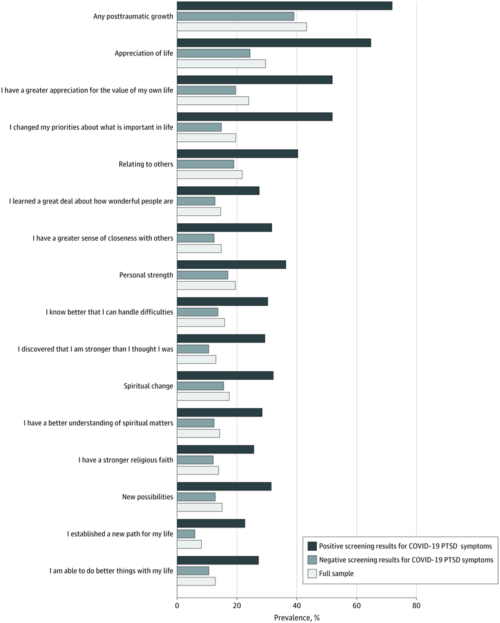Study Finds Some Positive Psychological Benefits
WEST HAVEN, CT — VA has not recorded an increase in veteran suicide during the pandemic, and one study found that some veterans have experienced positive psychological benefits from the enforced isolation and slowing down of their world.
VA officials have stressed, however, that the long-term effects of the pandemic on veterans’ mental health will not be understood for years and that the department still has work to do to reach those patients who need assistance.
A study of 3,000 veterans participating in the National Health and Resilience in Veterans Study (NHRVS) found that 43.3% of respondents reported that the pandemic led to some positive psychological changes in their lives. Areas of growth included improvements in their appreciation of life, relationships to others and personal strength.1
“Although extensive research has documented the negative psychiatric consequences of the COVID-19 pandemic, no study, to our knowledge, has examined whether the pandemic may be associated with positive psychological changes or post-traumatic growth (PTG),” the study’s authors wrote in JAMA Network Open recently. In addition to increasing risks for psychiatric illness, traumatic events may also stimulate PTG in the form of increased personal strength and appreciation of life, improved social relationships, spiritual changes, and new possibilities for one’s life. Post-traumatic growth is associated with better functioning and greater resilience to subsequent traumatic events in trauma survivors.”
Example questions included: “In the past month, how much were you bothered by: repeated, disturbing, and unwanted memories of the COVID-19 pandemic.”
Veterans who screened positive for COVID-19-associated PTSD symptoms reported positive impacts of the pandemic at a much higher rate (70%) than those who screened negative. According to the researchers, this was consistent with previous studies on trauma.
Suicide Risk Prevention
“Symptoms of PTSD associated with COVID-19 may prompt reflective processing of the pandemic, which may in turn help stimulate positive psychological changes,” reported VA Connecticut Healthcare System researchers and colleagues. “[This finding] underscores the importance of evaluating PTG-promoting interventions as part of suicide risk prevention and treatment efforts in veterans.”
The researchers said they plan to follow the study cohort over time to examine the long-term consequences of PTG and whether it can act as a protective factor against subsequent trauma.
Testifying before the Senate VA Committee in late March, David Carroll, VA’s director of the Office of Mental Health and Suicide Prevention, said that the pandemic has not resulted in a documented increase in veteran suicide.
“Findings to date do not indicate there are pandemic-related increases in veteran suicides; non-fatal suicide attempts; or the volume of emergency department visits related to suicide attempts. However, the long term impact and the rest of the data remains unknown,” he explained.
According to Carroll, VA has been able to maintain continuity of mental healthcare for veterans during the pandemic. The department also is adapting current suicide prevention plans to account for the effects of the pandemic.
“We know that pandemics, especially those involving quarantines, create psychological distress and negatively impact society beyond the period of the pandemic itself,” Carroll said.
VA, along with its private-sector counterparts, has leaned on telehealth to keep its continuity of care unbroken. However, not all veterans have easy access to the technology that would allow them to connect virtually.
“Bandwidth, equipment, familiarity—VA has tried to address all of those throughout the last year,” Carroll said. “We’ve distributed 109,000 iPads to veterans, so they could connect into care in the VA. We’ve also provided hotspots where they don’t have bandwidth right now … We have also put in place what we call a white glove program. Someone will reach out to that veteran and help them get connected and help them understand how the iPad works, so they’ll be ready for their appointment.”
At the same hearing, legislators heard from a number of veterans advocates, including retired Air Force Lt. Col. Jim Lorraine, president of America’s Warrior Partnership. He stressed, as mental health experts have in the past, that mental healthcare should be only one facet in an effective suicide prevention strategy.
“Suicide is more than just mental health,” he told legislators. “It’s housing, employment, relationships, finances. It’s a big-picture piece. To keep looking at suicide prevention as solely a mental health solution is somewhat alienating. But if you look at it holistically, that will reduce the stigma, and it will bring people in enough to see that their needs are met.”
-
Pietrzak RH, Tsai J, Southwick SM. Association of Symptoms of Post-traumatic Stress Disorder With Post-traumatic Psychological Growth Among US Veterans During the COVID-19 Pandemic. JAMA Netw Open. 2021 Apr 1;4(4):e214972. doi: 10.1001/jamanetworkopen.2021.4972. PMID: 33830230.


